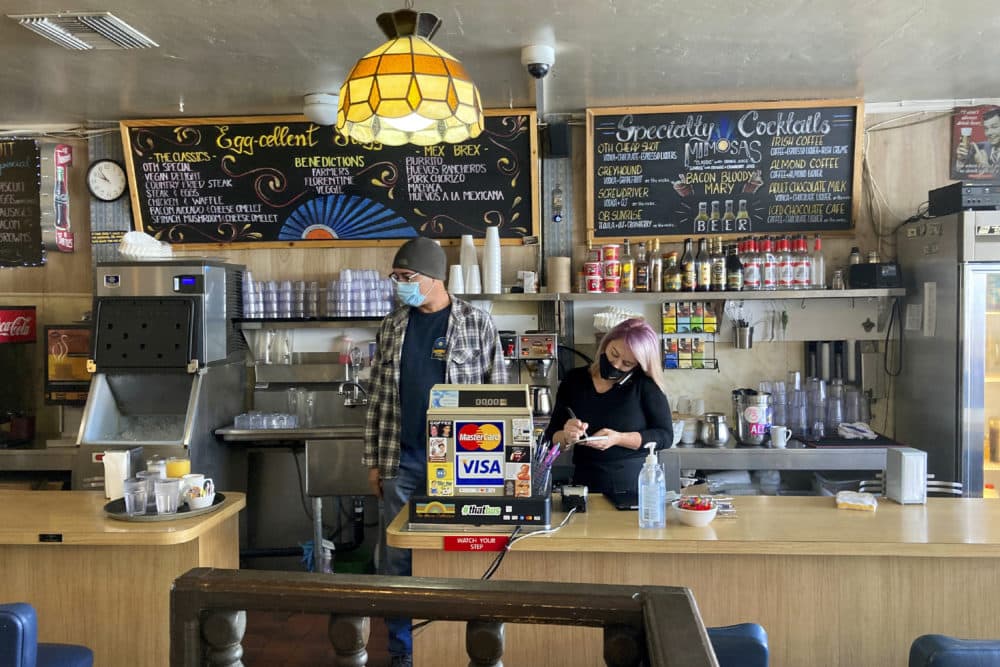Advertisement
Commentary
As we find our way back to each other, ‘Thank you for seeing me’

We were at my son's wedding in California last week, where most of us were staying at the same hotel. My sister-in-law and I were passing through the hotel restaurant when we saw a server struggling to open the glass patio door while balancing a huge stack of dishes. We rushed to open the door for her.
“Thank you for seeing me,” the woman said with a smile.
Such a tiny moment, yet it stayed with me. Thank you for seeing me. How easy it is, especially in our paranoid, pandemicine age, to look right through everyone we encounter without really seeing them. This is especially true of the people who serve us, the store clerks and restaurant servers, the flight attendants and trash collectors, the road crews and Lyft drivers.
Most of us stride about unmasked these days, but the art of idle conversation — what little art we had left, after cell phones came on the scene and demanded our attention — seems to have evaporated with the phrases “viral load” and “social distancing.” Is it fear that keeps us from connecting? Or complacency?
How easy it is, especially in our paranoid, pandemicine age, to look right through everyone we encounter without really seeing them.
That night, my son's wedding took place in a vineyard. It was a fantastic hilltop venue with Instagram views. As I stood by one of the serving tables during the reception, I said hello to the man carving meat for bahn mi sandwiches. “How are you holding up in this heat?” I asked.
“At least the hills aren't on fire like last year,” he said. “We got lucky.”
He confided in me that his house was one of hundreds that burned in a wildfire that had consumed large parts of Santa Rosa a couple of years ago. “I lost everything,” he said. “The worst was losing all my family photographs.”
I see you, I wanted to say, but the line of people waiting to be served was growing restive, so I walked away with my plate, looking with fresh eyes at the dry hills of Sonoma bathed gold in the sunset. The grass was like dry cereal beneath my feet.
The next morning, only one woman was taking guest orders for coffee and breakfast at the hotel restaurant. She was in her mid-60s, gray-haired and looking tired.
Advertisement
“Must be tough, being on your own here,” I said.
She shrugged. “I'm used to it. Staffing shortages, you know? Two years of wildfires, then the pandemic. What can you do?”
“Well, you're doing a great job of holding it together,” I said, thinking, I see you.
[W]e all have untold stories from the past few years, stories that deserve to be unfolded gently and offered to one another, so that we can maintain our humanity despite the uncertainty.
My husband and I spent a few days in San Francisco after the wedding before flying home. As we boarded the plane back to Boston, a flight attendant greeted us with a bright smile. “Enjoy your flight, and let me know if there's anything I can do to make it better,” she said.
I saw her several times after that, hands encased in blue plastic gloves, doling out snacks or picking up trash. Smiling, smiling, smiling through passenger demands.
“Thank you,” I said when we were deplaning in Boston. “Your smile made it a better trip.”
Her smile, if possible, grew wider. “Thank you,” she said.
Back in Boston after the red-eye, we picked up our car and stopped at a diner on our way home, hoping to snap out of our travel coma. The diner was a motorcyclist hangout; the customers were gray-haired guys in leather chaps and jackets. Fox News played on the TV. The woman serving us wore a mini skirt but had to be on the other side of 60.
“What's up, kids?” she asked. “You two look like you could use some coffee to see you home and then a nap.”
“You're so right,” I said.
Maybe that really is the solution to these crazy times: more naps. We're all so weary. The COVID pandemic is over, yet not. Monkeypox is grabbing headlines. The divisive political scene rages like those wildfires. Inflation is doing who-knows-what. The collective uncertainty about our future — the planet's, our nation's, our children's — looms large.
We're able to take a breath for now. To go to weddings and family reunions and embrace our loved ones. To make conversation with strangers again. I am so grateful for all of that. But it's a reminder, too, that we all have untold stories from the past few years, stories that deserve to be unfolded gently and offered to one another, so that we can maintain our humanity despite the uncertainty.
The waitress returned with the coffee pot when we were halfway through breakfast. “There, now, you're doing a good job,” she said, pointing to my half-finished plate of eggs. “That'll give you fuel to make it home.”
“Yes,” I said. “It's just what we needed.” Thank you for seeing us.
